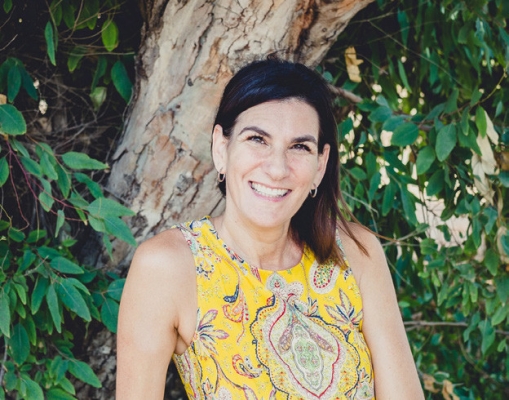Breathing Toward Post-Traumatic Growth
I was walking down the street the other day when a sudden noise that sounded like a rocket siren pierced the air. For a moment I had an all-too-familiar tight feeling in my stomach, but then a motorbike sped past me and I realised with relief what had made the sound. A motorbike roaring down the road; a message ping on a cell phone that sounds like the pre-warning of an incoming rocket attack are just two things that have made me jump since October 7, 2023. Sometimes it feels like I breathed in on that awful day and I'm just about exhaling now, two years later. Even though right now there is a ceasefire, I'm still on edge, and I know I'm not alone in feeling like this.
"Inhaling activates our sympathetic nervous system, triggering our fight-flight-freeze response to stress, which is why during a panic attack one repeatedly inhales," explains Britt Sevitt, a mind-body-soul healing facilitator, whose work since October 7 has included supporting survivors of the Nova music festival, bereaved families, and soldiers on the battlefield.
"We have been in hyper-vigilant, high-alert, survival mode for two years – an awful place to be for such a long period of time. When we exhale, it activates our parasympathetic nervous system and our relaxation response. Since October 7 there has been individual, collective, secondary and vicarious trauma and we have all been affected. It's very extreme that we have been waiting two years to allow ourselves to finally exhale, process and heal."
I have been friends with Britt for many years and knowing about her work and how she overcame her own trauma challenges make her the ideal person for me to talk to about how to try and process the past two years, and which tools will help us do so.
After studying Psychology and Philosophy and completing a Master's at Cambridge University, Britt went through two decades of depression, anxiety, and post-trauma. "After trying every conventional route - including many medications and years of talk therapy - I eventually found true healing through alternative modalities, including meditation, and also experienced a profound spiritual awakening. This transformation inspired me to study and train in the therapies and practices that supported my own healing."
So now that we have a ceasefire, perhaps we can begin to process and heal. But how do we even start to get to grips with the trauma of it all?
"Trauma can have detrimental effects, however it can also be a gateway for growth - which is what happened to me," says Britt. "Post-traumatic growth is defined as the positive psychological change some individuals experience after a major trauma or stressful life event. Now is our opportunity to process and heal. If we don't, the unprocessed emotions can remain stored in the body and contribute to emotional or even physical issues. For the past two years we have been in that inhale and have not allowed ourselves to fully feel and process what was going on. Making space for our emotions, which are energy-in-motion, allows them to pass through us and not stay stuck."
One powerful tool, says Britt, is our breath. "It is with us 24/7 and deeply connects us to our soul. The words neshima (breath) and neshama (soul) come from the same root."
BREATHING EXERCISES
1) Focus on your breath: by simply placing your focus on each inhale and exhale, your breath begins to slow down and deepen and this activates the parasympathetic nervous system. Inhale through the nose and exhale either through the nose or mouth. You can't focus on your breathing and your thoughts at the same time and this is a basic, effective form of meditation.
2) Belly-breathing: place a hand on your stomach - with each inhale allow your belly to expand like a balloon and with each exhale pull your belly back towards your spine. This breathing is healthier, deeper and more beneficial than breathing primarily from your chest.
3) Count breaths: inhale for 4 counts, exhale for 4 counts; eventually increase to 5-5 or 6-6.
4) Extend the exhale: this activates the relaxation response. Inhale for 4 counts, exhale for 6.
For even deeper relaxation: inhale for 4, hold your breath for 7, and exhale for 8.
Try these for 2-3 minutes, when possible with your eyes closed, and see if you feel more relaxed. They are great ways to learn how to relax our systems again.
In addition to breathwork, grounding is essential.
"We need to be fully grounded in our bodies, especially after trauma," Britt explains. "If not, we feel anxious and disconnected. Spending time in nature, walking barefoot on the earth, and engaging your senses can help bring you back into your body. Using mindful awareness - simply noticing and naming what you can see, hear, feel, smell, or taste - is an effective way to return to the present moment. These practices help calm the nervous system and restore a sense of safety."
Britt says that, quite simply, meditation changed her life. "There are dozens of emotional, mental, physical and spiritual benefits of meditation. I always recommend people to Google 'benefits of meditation'! Meditation is actually what prayer used to be. It connects us to beyond this realm and expands our consciousness. 'Prayer is talking to God, meditation is listening to God', is my favorite quote. Meditation is what connects us to our inner Divine guidance, our souls. It requires consistent practice. You don't need professional guidance; there are a multitude of guided meditations on YouTube and dozens of excellent apps. It is simply about practicing focus. Every time you are caught up in your thoughts, you bring your attention back to what you are listening to, or to your breath."
It must be an extra challenge to work here in Israel, with the frenetic pace of life and rollercoaster existence. And I wonder: do people feel guilty about spending time 'just' meditating?
"We are living in a world where we value productivity," agrees Britt. "We are running and doing all the time. But we are human beings not human doings. Can we just 'be' rather than 'do'? Sitting and meditating is the antithesis of everything we've been taught, but actually after meditating you become more productive. For many people, the idea of sitting down and being with your thoughts is abhorrent. In fact, it is exactly what we need: to quietly be with our thoughts, emotions and sensations, observing them and allowing them to pass by without judgement, attachment or resistance. This also helps us stop becoming so reactive."
It is notable that many Israeli hostages have said that faith and spiritual practices were a primary source of strength and resilience during their captivity. These spiritual experiences often intensified pre-existing beliefs or led to newfound faith, and they played a crucial role in the hostages' survival and healing process.
"The hostages' testimonies are proof that spiritual growth can happen even through the darkest days of suffering and trauma," says Britt. "We have now all been given this opportunity to work through our own trauma, reconnect with ourselves, to heal and to grow."
Britt Sevitt is a Mind-Body-Soul Healing Facilitator and Guide integrating numerous holistic and trauma-focused modalities including Breathwork Therapy, Somatic Trauma Therapy, EMDR, Awakening Coaching, Energy Healing and Meditation/Mindfulness techniques.
She offers 1:1 sessions, consultations, workshops and retreats.
www.brittsevitt.com









Comments